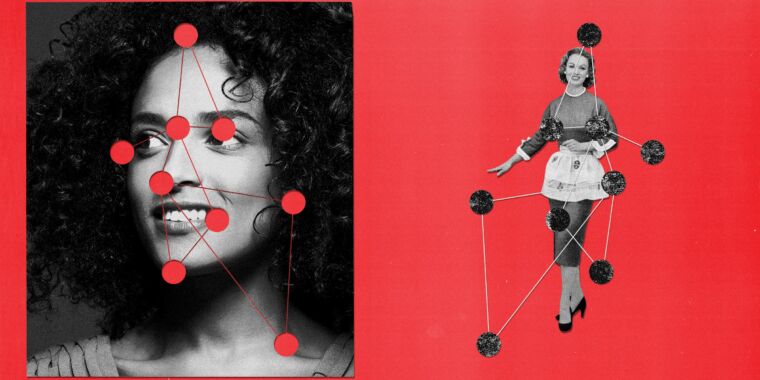When AI sees a man, it thinks ?official.? A woman? ?Smile?
Companies, agencies, institutions, etc
Profile
GESIS Leibniz Institute
the Social Sciences
New York University
American University
University College Dublin
University of Michigan
California YIMBY.The
Google’s
Amazon
Microsoft
Crowdworkers
IBM
AI
companies’
Border Patrol
World Press Photo
Princeton
Open Images
Condé Nast
Affiliate Partnerships
People
Tom SimoniteTo
Profile
Carsten Schwemmer
Steve Daines
Lucille Roybal-Allard
Ling Ling Chang
Tracy Frey
Olga Russakovsky
’d
Cathleen Galgiani
Jim Beall
Groups
European
Black
Republican
Honduran
Physical locations
Google’s
Places
No matching tags
Locations
US
Köln
Germany
California
Texas
Russakovsky
Princeton
Events
No matching tags

Summary
Crowdworkers were paid to review the annotations those services applied to official photos of lawmakers and images those lawmakers tweeted.Google's AI image recognition service tended to see men like senator Steve Daines as businesspeople, but tagged women lawmakers like Lucille Roybal-Allard with terms related to their appearance.The AI services generally saw things human reviewers could also see in the photos. A company that used a skewed AI service to organize a large photo collection might inadvertently end up obscuring women businesspeople, indexing them instead by their smiles.When this image won World Press Photo of the Year in 2019 one judge remarked that it showed "violence that is psychological." Google's image algorithms detected "fun."Prior research has found that prominent datasets of labeled photos used to train vision algorithms showed significant gender biases, for example showing women cooking and men shooting. “So we’d better make sure they’re doing the right things in the world and there are no unintended downstream consequences.”An academic study and tests by WIRED found that Google's image recognition service often tags women lawmakers like California state senator Cathleen Galgiani with labels related to their appearance, but sees men lawmakers like her colleague Jim Beall as businesspeople and elders.One approach to the problem is to work on improving the training data that can be the root cause of biased machine learning systems. Russakovsky is part of a Princeton project working on a tool called REVISE that can automatically flag some biases baked into a collection of images, including along geographic and gender lines.When the researchers applied the tool to the Open Images collection of 9 million photos maintained by Google, they found that men were more often tagged in outdoor scenes and sports fields than women.
As said here by Tom Simonite, wired.com